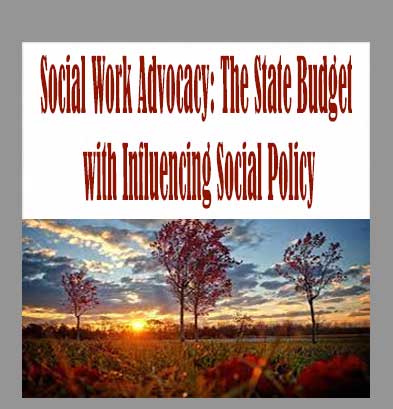Description
Social Work Advocacy: The State Budget with Influencing Social Policy download , Social Work Advocacy: The State Budget with Influencing Social Policy review , Social Work Advocacy: The State Budget with Influencing Social Policy free
Social Work Advocacy: The State Budget with Influencing Social Policy
Social Work Advocacy: The State Budget by Influencing Social Policy
Social workers spend a lot of time practicing within the limitations of the money allotted for their programs. It stands to reason that they should be major voices in deciding how much money their programs receive. Here’s how they can.
Social workers often don’t like to talk about money—they understandably just want to show up and help their clients. Many are the social workers who are “intimidated by numbers,” like one of the students in this video. Yet it is money that allows the social worker to help their clients. It’s money that makes programs possible. Too few social workers are involved in the allocation of funds when it comes to social services.
The fifth video in the Policy Affects Practice series takes the social work student step-by-step through a state budget process. With different voices along the way to calm the student’s fears, the viewer will learn what a budget is and see how it reflects state policy. Building on this, the social work student will learn the process of how a budget is finalized. The four main stages in the development of a budget are:
1. Preparation by agencies
2. Establishment by the governor
3. Legislative action on the budget
4. Governor’s review & budget implementation
Each stage is demystified and discussed at length and the possibilities for the social workers’ involvement are illustrated.
In an uncomplicated and painless manner the video shows how social workers can influence the state budget and describes six key skills social workers need to develop in order to become effective advocates.
In Depth
Many social work students are understandably overwhelmed when thinking about becoming a public face for social policy. Fears of not knowing enough, not understanding the political systems, and the idea that their primary role is working with clients has often meant that social workers’ voices are not heard when laws and policies are written. Policy Affects Practice is a six-part series that demystifies the legislative process and the many ways social workers can engage with it.
From a student’s perspective, the videos explore budgets, the legislative process, and the importance of coalitions.
After watching this series you’ll be able to:
- Describe how a budget is formed.
- Understand the legislative process and describe the steps for enacting legislation.
- Understand the importance of building coalitions with other social workers and learn how to do this effectively.
- Explain how direct practice experience can be an effective tool when advocating on the macro level.
- Illustrate the ethical dimensions of lobbying Congress for social workers using the National Association of Social Worker’s Code of Ethics.
Specs
Length of video: 00:20:49
English subtitles available
Bios
ISP is the only national membership organization dedicated exclusively to promoting social work’s involvement in policy and policy practice. Now a 501(c)3, it was created in 1997—in the wake of welfare reform–to address concerns about devolution. Comprised of social work educators, students, and practitioners, its expanded mission seeks to increase social work efficacy in influencing policy at all levels of government by educating students in policy and policy practice, and engaging students and faculty in the policy-making and political processes.
Frequently Asked Questions:
- Innovative Business Model:
- Embrace the reality of a genuine business! Our approach involves forming a group buy, where we collectively share the costs among members. Using these funds, we purchase sought-after courses from sale pages and make them accessible to individuals facing financial constraints. Despite potential reservations from the authors, our customers appreciate the affordability and accessibility we provide.
- The Legal Landscape: Yes and No:
- The legality of our operations falls into a gray area. While we lack explicit approval from the course authors for resale, there’s a technicality at play. When procuring the course, the author didn’t specify any restrictions on resale. This legal nuance presents both an opportunity for us and a boon for those seeking budget-friendly access.
- Quality Assurance: Unveiling the Real Deal:
- Delving into the heart of the matter – quality. Acquiring the course directly from the sale page ensures that all documents and materials are identical to those obtained through conventional means. However, our differentiator lies in going beyond personal study; we take an extra step by reselling. It’s important to note that we are not the official course providers, meaning certain premium services aren’t included in our package:
- No coaching calls or scheduled sessions with the author.
- No access to the author’s private Facebook group or web portal.
- No entry to the author’s exclusive membership forum.
- No direct email support from the author or their team.
We operate independently, aiming to bridge the affordability gap without the additional services offered by official course channels. Your understanding of our unique approach is greatly appreciated.
- Delving into the heart of the matter – quality. Acquiring the course directly from the sale page ensures that all documents and materials are identical to those obtained through conventional means. However, our differentiator lies in going beyond personal study; we take an extra step by reselling. It’s important to note that we are not the official course providers, meaning certain premium services aren’t included in our package:
Refund is acceptable:
- Firstly, item is not as explained
- Secondly, Item do not work the way it should.
- Thirdly, and most importantly, support extension can not be used.
Thank you for choosing us! We’re so happy that you feel comfortable enough with us to forward your business here.








Reviews
There are no reviews yet.